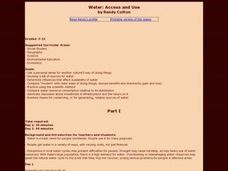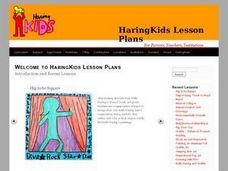Curated OER
"Lettuce" Learn About the Water Cycle
Young scientists investigate the water cycle through a lettuce seed experiment. For this experiment, learners plant lettuce seeds inside of a ziplock bag in order to create a small greenhouse. They observe condensation and precipitation,...
Curated OER
Water Cycle Lesson Plan
After conducting experiments with a sponge, ice water, and a soda bottle your young scientists become familiar with the water cycle through experiment, song, hand motions and drawing. Students sing about the water cycle and discuss...
NASA
The Case of the Wacky Water Cycle
Join the tree house detectives in learning about the processes of the water cycle, water conservation, water treatment, and water as a limited resource.
PricewaterhouseCoopers
Waste and Recycling: Recycling Paper
We take paper for granted, while thousands of trees are being made into the paper we toss in the trash. Start a dialogue about paper reduction and recycling in class, and share the negative effects paper production has on our...
Alabama Learning Exchange
The Water Cycle
Learners identify the stages of the water cycle. They listen to the book "Magic School Bus: Wet All Over," examine the Build Your Own Water Cycle website, predict and measure the amount of water in a jar for a week, and read a short play...
PricewaterhouseCoopers
Waste and Recycling: Recycling and Energy Recovery
Reduce, reuse, recycle, and recover. Young environmentalists learn about the overwhelming amount of garbage produced and discover better ways to minimize their impact on Earth by learning the difference between garbage and...
Curated OER
What Are The Properties of Sea Water?
Ninth graders conduct research on the subject of sea water. They use a variety of resources to obtain information. There are helpful resource links listed in the lesson. In conjunction with the research students make inquiry of the...
Curated OER
Water: Access and Use
Learners get a personal sense for another culture's way of doing things. Develop a list of sources for water. Practice using the scientific method. Examine means for conserving, or for generating, reliable sources of water.
Curated OER
'Round and 'Round it Goes!
Students discuss and interpret background knowledge on poster copy given on the water cycle. Students complete the included activity sheets using the poster as a reference in small groups. Students identify and name where water can be...
Curated OER
Water Cycle (Grades 2-4)
Young scholars demonstrate their understanding of the water cycle and how it effects the environment by graphically depicting and describing the water cycle.
Curated OER
Water Cycle Column
Students use common materials to construct a working model of the water cycle. They then observe and explain evaporation, condensation, precipitation and percolation as aspects of a continuing cycle. Students also complete worksheets and...
Curated OER
Aquatic Science and IPC
Students explain the importance of water in our daily lives. In this aquatic science lesson, students identify different ways to purify water and make it potable. They design and construct a water filter based on researched information.
Curated OER
How Can We Conserve Water?
Students describe the importance of water conservation and list ways to conserve. They construct composts and fill them with materials that recycle nutrients. They inspect their homes for leaky pipes, toilets, and faucets.
Curated OER
Trash Disposal Choices
Learners determine the differences between reusable, compostable and recyclable trash.
Curated OER
Talkin' Trash (All About Landfills)
Students investigate the types of waste created by people and identify various options for trash disposal. They read and discuss a handout about what a landfill is and the different types of trash, match types of trash with the proper...
Curated OER
Now you see it....Now you Don't
Students investigate the biodegrading process of packing peanuts. In this biological process lesson, students conduct an experiment to see how quickly packing peanuts biodegrade. Students check the process each day and record their results.
Curated OER
Aquifer Model
Young scholars, after researching and brainstorming about aquifers and locating aquifer maps of Texas, participate in the building of a model of an aquifer complete with a pumping station. They also answer a variety of questions at the...
Curated OER
Think Green
Pupils experience and practice compositing and recycling through hands-on-activities. They distinguish between which items from their trash can be recycled, composted and reused. The process for making recycled paper is also covered in...
Curated OER
Trash Disposal Choices
Students investigate the use of landfills. In this landfill use and recycling lesson, students discuss what happens to trash and junk. They review the types of trash before categorizing a list of items they throw away each day. They...
Curated OER
Mixing Up Magic
Students explore the relationship between art and science through experimenting with color, design and recycled materials and creating their own art work.
Curated OER
Mini-Sanitary Landfill
Second graders work in groups to bury a variety of trash items and arrange them in a mini-landfill. They predict which items will biodegrade and then keep records of what the items look like every ten days. Students consider how...
Curated OER
Making Paper
Students create paper by adding a few small scraps of paper into the blender pitcher and adding just enough water to thoroughly soak paper.
Curated OER
Using Our Natural Resources Wisely
Middle schoolers understand how ground water can be recycled to maximize its usage and begin to think about ways conservation can help Kansas preserve its natural resources in other areas - soil, minerals, and clean air.
Curated OER
Fireplace Logs from Newspapers
Students discuss the topic of recycling. They identify items that can and cannot be recycled. They practice using their newspaper to make other items.























